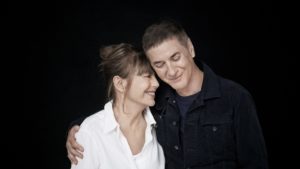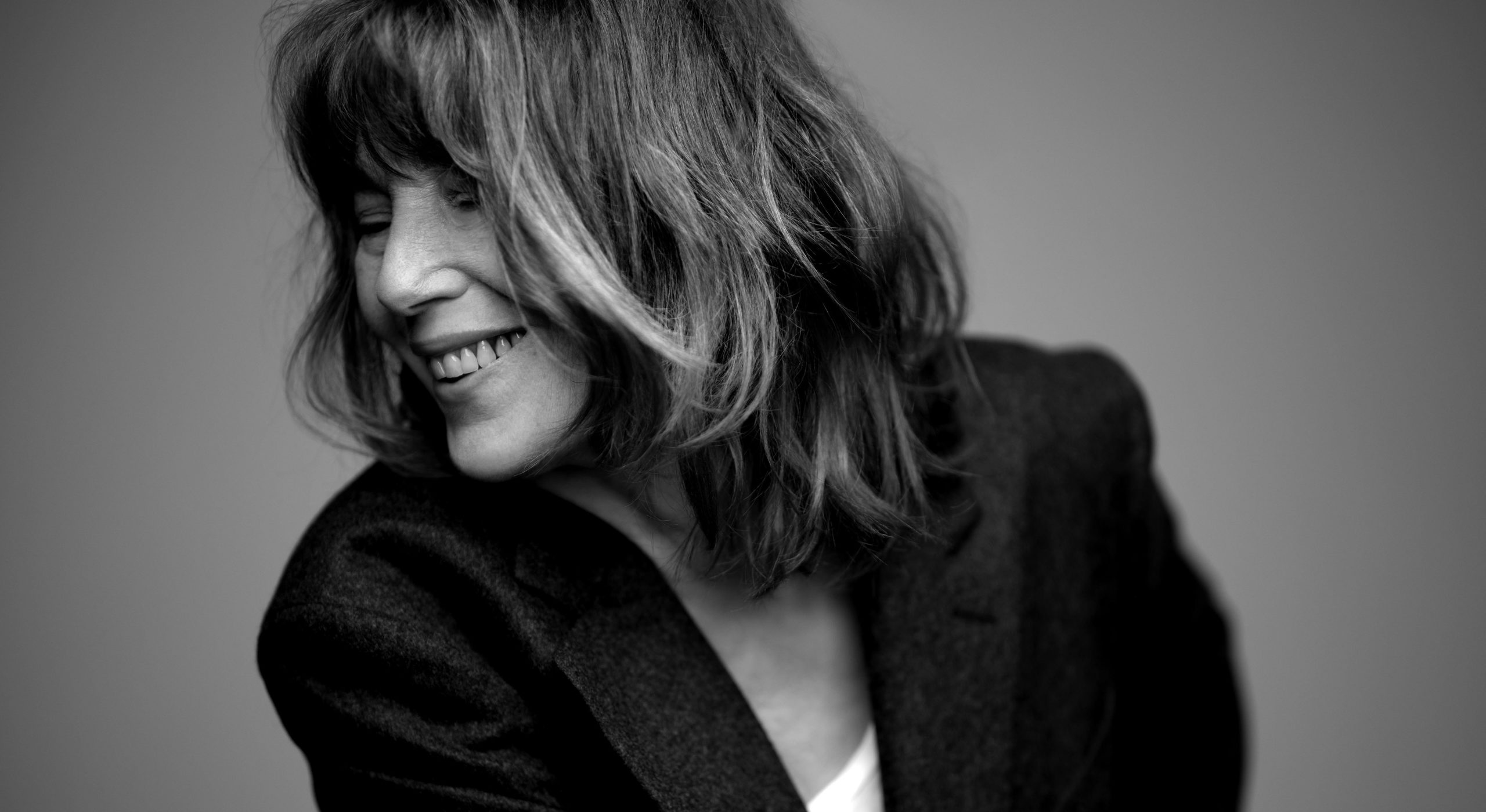Since starting her solo music career in earnest with 1998’s À la légère, away from any writing or production credits from her famed paramour, the decadent genius of l’amour Serge Gainsbourg, British-born actor and vocalist Jane Birkin has asserted herself, more and more, as a poetess of the forlorn and the frank.
Yes, there’s long been an occasionally giddy lustfulness to her solo musical work usually associated with Gainsbourg, her daring duet partner for 1969’s breathily erotic “Je t’aime…moi non plus.” But Birkin’s poetic smarts and her tendency to make love and loss as much a part of her song as her own whispered sensuality has remained strong and face-forward. Even with 2017’s orchestral tour, Birkin/Gainsbourg: The Symphonic, Serge’s classically inspired heartache and heartbreak became fully hers—she had transcended a life’s worth of inspiration and made it inherent, uniquely her own.
Now, affected deeply by the sudden death of her eldest daughter—photographer Kate Barry, who died in 2013—and plagued by ghosts (Serge’s included), but buoyed by elements, good and bad, of the aging process, Birkin has recorded and released Oh ! Pardon tu dormais… Based on self-generated poems and a play of the same name, Birkin’s new album is intimately world-weary and forlorn, yet at the same time seems to look forward to what’s next, to crave and savor her future, even if it means looking toward her ultimate end.
We caught up with Birkin on the thirtieth anniversary of Gainsbourg’s passing to discuss her past, present, and future.
The last time I saw you was the Carnegie Hall shows celebrating Serge with Birkin/Gainsbourg: The Symphonic. How did that stir new works beyond it?
I don’t think that it influenced anything of what I’m doing now beyond continuing to glorify the beauty of his music, and the music he took from the great composers—he loved Chopin, Grieg and Brahms, for instance. If he felt as if he wanted to give us something really wonderful, like “Lemon Incest” [for daughter Charlotte Gainsbourg] or “Initials B.B.” [for Bridgitte Bardot] he used classical music. He did that for me often with “Lost Song” and “Jane B.” And we did it with the sweep of cinematic music, with movie music, the sort where violins were at work to signal something awful was about to happen.
Most “orchestral” concerts are those which people would do at the end of their careers. Ours would never have been boring to Serge. I couldn’t do better for Serge than that. When I was singing his songs during The Symphonic, I was Serge. I was singing his sadness, his distress, his feelings. Whereas when I am singing my new album, it is me. All me. It is strange, too, to sing for yourself when you have been someone else for so many years.
“When I was singing his songs during The Symphonic, I was Serge. I was singing his sadness, his distress, his feelings. Whereas when I am singing my new album, it is me. All me. It is strange, too, to sing for yourself when you have been someone else for so many years.”
When did the process for the new album commence?
The first new text I had written for the album was two years ago while on tour with The Symphonic, miserable in a hotel bedroom. I had seen a manicurist’s set that reminded me of Kate [Barry]’s feet. She used to take such nice care of them. That brought me down something, so my artistic director on that show, who was in the lobby, told me that I should write everything down, which became the basis for “Cigarette.” Combine that with bits of the play I had written twenty years ago, and “Catch Me if You Can,” which I had gone to Brittany to write a requiem, and wound up with that. I couldn’t write a requiem, but I did think of Kate, and of Ulysses, and of coming back to your parents.
Kate actually wrote something on a Post-it I had found: “Happy as Ulysses between his parents.” I thought, “Ah, perhaps that is something that all children want, the safest place in the world being between one’s parents. Étienne Daho [Birkin and Jean-Louis Pierot’s musical collaborator] tried to write the music in a way that was anything but ‘Serge Gainsbourg.’ Because that would be so obvious. Yet Étienne was influenced by John Barry [Birkin’s first husband, the composer famed for his James Bond theme]. It is natural, though, for people to associate me with Serge, which is very nice. But there was no effort to go that route. That would be impossible. He invented the new French language, so far ahead of his time. Serge was so amazingly avant-garde. His songs were gifts to me. I had everything I had needed from kind Serge.

with Étienne Daho / photo by Romaine Winkler
You spoke a moment ago of singing for and as yourself after having represented someone else, Serge, for so long. Do you feel as if with Oh ! Pardon you’re finally trying to move away from his mythology? Put some sort of punctuation on that past, and move forward?
Not really, because I still do perform The Symphonic. I can imagine it at any moment. In fact I’m doing that this December: one night Serge songs, the next night mine and Oh! Pardon tu dormais… which is a bit daunting. I can, however, pick Serge’s songs up at any time, which is nice. It’s not something that I will ever say goodbye to. And it is good to be able to express oneself. I did that on Oh! Pardon tu dormais… and I did that on another album of mine, Winter’s Children. Working with Étienne, he shook things up for me, and made me think of things that were sexual beyond the tone of the rest of the new material, never downbeat. He was very enthusiastic and encouraging, which was great, as he is an amazing songwriter and singer in his own right. I didn’t feel that alive for some time.
Songs on the new album dealing with lust and sensuality show that you’re not singularly singing and thinking about—quite frankly—ghosts.
Indeed. That was a quality of Étienne’s. Yes, he went along with “Ghosts” and “Catch Me If You Can.” Left on my own, I may have just contemplated the past and been only a sad person. He pulled me out of that. The only way to get out of a bad or sad feeling is to make something out of it. If you have the luck of being an artist of any sort, then it becomes something else.
“The only way to get out of a bad or sad feeling is to make something out of it. If you have the luck of being an artist of any sort, then it becomes something else.”
Many of your words on the new album were from a play of yours, and from poetic diary jottings. When and why did you make the decision to open up publically about your daughter, Kate? It’s been years since her passing.
For me, it seemed to be impossible to make a record about personal feelings without talking about her. I had been silent for seven years. It moved me too much, and I didn’t know how to address the topic in any way that wasn’t just too sad. My daughter Charlotte did music about Kate that was so beautiful. My daughter Lu contemplated Kate as well—they both did something artistic with her passing, and I had not. I was sitting around being miserable. There was no urgency in talking about her then. I was always afraid of being too moved. But an album of personal feelings and recollection? It then became impossible not to talk about her, the most important thing that had happened to me, being her death. She is, therefore, around on this album. Writing a song about her now is shocking. It becomes something else. It is not, any longer, impossible to sing. Difficult, yes, but not impossible.
In “Catch Me if You Can” you say, “I’m almost gone from view.” What is it like looking into the great beyond, signaling your own death? How is it to script one’s own epitaph?
I couldn’t write my own, really, so I thought about writing about Kate. I thought of the last time I saw Kate, and her sitting close to the piano at a show I did. We were wondering, did she decide to leave the room while we were all there, tip-toeing out? The bit in the song where I ask if we were too late was for her.
Charlotte Gainsbourg, not so long ago, spoke about “cancel culture” and mentioned how Serge would have been up to his eyeballs, struggling with censorship and the possibilities of that which was appropriate. What’s your take?
I don’t know. Serge was so incredibly honest. So truthful. Would he have wavered to sing “Lemon Incest” to Charlotte? I know he wrote it because he was unable to resist its play on words. It was a love song for Charlotte, of the love that they could never have because he was her father. I always knew that. Would he be able to write it today? I’m sure he would. Would he have burned five pound notes on television? Absolutely, because that’s what the tax man takes in France. Would people be frighteningly shocked? They were at the time, and things are still true now. FL

photo by Nathaniel Goldberg









